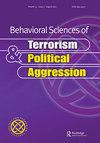Understanding youth radicalisation: an analysis of Australian data
IF 1.4
Q2 POLITICAL SCIENCE
Behavioral Sciences of Terrorism and Political Aggression
Pub Date : 2020-09-15
DOI:10.1080/19434472.2020.1819372
引用次数: 18
Abstract
ABSTRACT Studies on youth radicalisation are few, even though it has been identified as an increasing problem. This paper aims to contribute insights on youth radicalisation by examining data from 33 cases of Australians, aged 19 and below, who have been identified as radicalising to violent extremism. It draws on a subset of data from the Profiles of Individual Radicalisation in Australia (PIRA) dataset. This is an open-source dataset that replicates variables from the Profiles of Individual Radicalisation in the United States (PIRUS) dataset. The PIRA dataset is outlined and we undertake a descriptive and exploratory analysis of selective key variables identified in the terrorism and criminology literature. Analysis shows that radicalisation amongst our sample of youth is associated with poor educational achievement, mental health problems, active engagement with online social media, exposure to other radicalised networks and associates, personal grievances and triggering events. The data both confirm and diverge from the existing literature. The paper, in particular, considers the role of social bond attachments and networks in the youth radicalisation problem. Limitations in the study design and sample size are acknowledged and implications for the prevention of youth radicalisation are considered.理解青年激进主义:对澳大利亚数据的分析
摘要:关于青年激进主义的研究很少,尽管它已经被认为是一个日益严重的问题。本文旨在通过研究33例19岁及以下的澳大利亚人的数据,对青年激进主义提供见解,这些人被认定为暴力极端主义的激进化者。它借鉴了澳大利亚个人激进概况(PIRA)数据集的一个子集数据。这是一个开源数据集,复制了美国个人激进概况(PIRUS)数据集中的变量。概述了PIRA数据集,我们对恐怖主义和犯罪学文献中确定的选择性关键变量进行了描述性和探索性分析。分析表明,我们的青年样本中的激进化与教育成绩差、心理健康问题、积极参与在线社交媒体、接触其他激进化网络和同事、个人不满和引发事件有关。这些数据既证实了现有文献,也偏离了现有文献。该论文特别考虑了社会纽带依恋和网络在青年激进化问题中的作用。承认了研究设计和样本量的局限性,并考虑了对预防青年激进化的影响。
本文章由计算机程序翻译,如有差异,请以英文原文为准。
求助全文
约1分钟内获得全文
求助全文
来源期刊

Behavioral Sciences of Terrorism and Political Aggression
POLITICAL SCIENCE-
CiteScore
4.80
自引率
10.00%
发文量
27
 求助内容:
求助内容: 应助结果提醒方式:
应助结果提醒方式:


